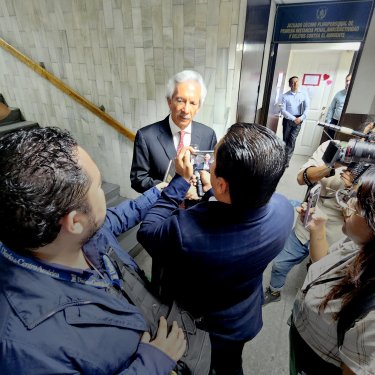Guatemala: RSF advocacy mission highlights urgent need for the release of Jose Rubén Zamora as a priority for the new government

Following an advocacy mission to Guatemala, Reporters Without Borders (RSF) has underscored the urgent need for the release of elPeriódico publisher Jose Rubén Zamora as a matter of priority for the new administration of President Bernardo Arévalo. Travelling to the country from 4 to 7 February, RSF’s Latin America Bureau Director Artur Romeu visited the journalist in prison and attended a court hearing in a money-laundering case against Zamora, in addition to meeting with representatives of the new government.
The imprisonment of journalist and founder of the newspaper elPeriódico, Jose Rubén Zamora – also a 2023 laureate of RSF’s Press Freedom Prize – has become a flagrant and unavoidable emblem of the press freedom situation in Guatemala. Having been held since 29 July 2022, Zamora’s detention is an affront to due process and the rule of law. International attention to Zamora’s case continues to grow, and will prove to be a key obstacle for the new administration of President Bernardo Arévalo.
On 5 February, President Arévalo reaffirmed his commitment to guarantee press freedom in an official ceremony held in the presence of several ministers and secretaries of state at the National Palace – also attended by RSF’s Latin America director. Arévalo declared that under his government journalists would no longer be persecuted, and highlighted Zamora’s case: "we all know that this is a spurious trial that originated in an attempt to make him an exemplary punishment for what he published."
On the morning of the same day, the reality was radically different at the Torre de Tribunales court, where Zamora was taken from jail in handcuffs to attend a hearing in a money-laundering case against him. The hearing was held in a very small room, with room for no more than six people, and took place behind closed doors, as although the hearing was meant to be public, RSF’s representative, diplomatic observers, and journalists were barred access.
The hearing lasted less than 15 minutes, and was then suspended and rescheduled for 21 February, in a clear strategy to further delay proceedings, which had already been postponed twice last year. A TrialWatch Impartiality report on the Zamora case, released the same date, detailed numerous violations of international and regional fair trial standards and concluded that Zamora's prosecution and conviction appear to be in retaliation for his work as an investigative journalist reporting on governmental corruption.
The striking parallel between these two episodes, which took place on the same day, illustrates the institutional tension that currently exists in the country. The healthy change of stance by the government of President Bernardo Arévalo to expand guarantees for the practice of journalism in Guatemala faces the challenge of dealing with corrupt structures inside and outside the State, which in recent years have consolidated a perverse system of persecution and criminalisation of journalists.
Detention conditions
During a visit to Zamora's cell in prison, RSF's Latin America Bureau Director was able to see improvements that have been made since the arrival of the new government, particularly after the visit of the Minister of the Interior, Francisco Jiménez, two weeks prior. A heater has been installed in the shower, as well as light bulbs and a window covering an area through which clouds of dust and insects used to enter. The periods during which Zamora is permitted to be outside of his cell have also been extended. The conditions are basic, but they are an improvement considering that for nearly a year and a half Zamora was the victim of mistreatment and abuse during his incarceration.
Improving detention conditions was one of the points raised by RSF during a meeting with the head of the Presidential Commission for Peace and Human Rights, Oswaldo Samayoa. RSF delivered to him its petition with more than 8,500 signatures from dozens of countries calling for Zamora’s immediate release. Samayoa said that an official visit has been requested to the Organisation of American States’ Special Rapporteur for Freedom of Expression to follow up on the case, as Zamora is a beneficiary of precautionary measures of the Inter-American Commission on Human Rights. The need to develop a public policy for the protection of human rights defenders and journalists – a stated priority of the government's 100-day agenda – was also addressed.
During the mission, RSF also had the opportunity to meet with journalists, lawyers and representatives of national and international human rights organisations.
Guatemala is ranked 127th out of 180 countries in RSF’s 2023 World Press Freedom Index. RSF continues its global campaign to #FreeZamora!